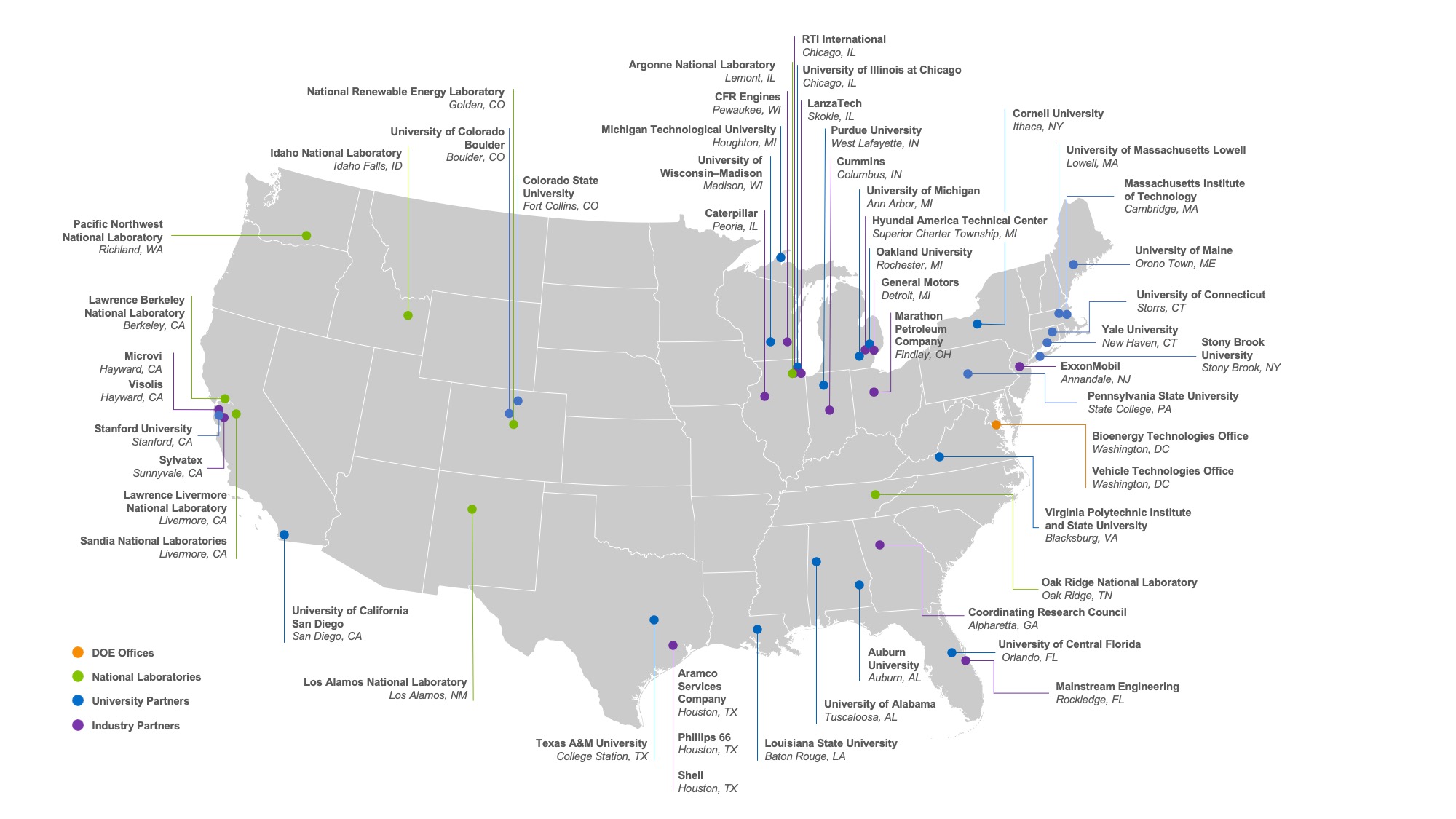Partners from National Labs, Universities, and Industry
The U.S. Department of Energy’s (DOE’s) multiyear Co-Optimization of Fuels & Engines (Co-Optima) initiative relies on the combined capabilities of leading researchers and facilities based at multiple national laboratories, universities, and industries across the country to help guide the direction of research and development.

Selected through competitive Funding Opportunity Announcements (FOAs) and Directed Funding Opportunities (DFOs), Co-Optima university- and industry-led projects involve close collaboration with National Laboratory Consortium members from the National Renewable Energy Laboratory (NREL) and Argonne (ANL), Idaho, Lawrence Berkeley, Lawrence Livermore, Los Alamos (LANL), Oak Ridge (ORNL), Pacific Northwest (PNNL), and Sandia National Laboratories to advance the goals of the Co-Optima initiative. The Co-Optima initiative is jointly sponsored by the DOE Office of Energy Efficiency & Renewable Energy’s Bioenergy Technologies Office and Vehicle Technologies Office.
- DFO for Collaboration with National Laboratories – Projects Awarded in FY 2021
- DFO for Collaboration with National Laboratories – Projects Awarded in FY 2020
- Bioblendstocks to Optimize MCCI Engines – Projects Awarded in FY 2018
- Light Duty Multimode (Spark-Ignition/Advanced Compression Ignition) Co-Optimized Engine & Fuel – Projects Awarded in FY 2018
- University-Led Projects – Projects Awarded in FY 2016
DFO for Collaboration with National Laboratories – Projects Awarded in FY 2021
Objective: Conduct applied research and development at the fuel-engine interface to move promising bioblendstocks and combustion approaches identified in Co-Optima closer to commercial adoption.
Projects:
- Aramco, Marathon, Caterpillar, and ANL: “Biofuel Blendstocks to Improve Low Load Combustion Performance of Heavy-Duty Gasoline Compression Ignition Engines”
- Coordinating Research Council, PNNL, and LANL: “Using Separation-Enhanced Isotope Ratio Mass Spectrometry to Enable Increased Renewable Carbon Content in Transportation Fuels”
- Cummins and ORNL: “Co-Optimization of Fuel Physical/Chemical Properties and Combustion System for Mixing Controlled Compression Ignition (MCCI) in a Medium-Duty Engine”
- Shell, ORNL, and ANL: “Independent Fuel Property Effects of Fuel Volatility on Low-Temperature Heat Release and Fuel Autoignition”
DFO for Collaboration with National Laboratories – Projects Awarded in FY 2020
Objective: Advance foundational knowledge and further research and development needed to accelerate adoption of performance-advantaged biofuel blendstocks
Projects:
- CFR Engines and ANL: “Development of Homogeneous Charge Compression Ignition Test Methods on a Variable Compression Ratio CFR Engine”
- ExxonMobil Research and Engineering Company and ANL: “Life-Cycle Analysis of Biofuels from Co-Processing in Petroleum Refineries”
- General Motors, ORNL, and NREL: “Biofuel Effects and Seasonal Fuel Property Variations Related to Abnormal Combustion Occurrences Observed in the Field”
- LanzaTech and PNNL: “100+ RON Gasoline Blendstock for High-Efficiency, Low-Emission Vehicle Engines”
- Shell and NREL: “Rational Optimization of Microbial Processing for High-Yield CO2-to-Isopropanol Conversion”
- Sylvatex and ANL: “Evaluation of Erosion Potential of Biobased Multicomponent Blendstocks Using Experimentally-Validated Computational Fluid Dynamics”
- Visolis and PNNL: “Renewable Octane Hyperboosting Blendstock for High-Efficiency Co-Optimized Engines”
Bioblendstocks to Optimize MCCI Engines – Projects Awarded in FY 2018
Objective: Develop and demonstrate single and multicomponent bioblendstocks for medium-duty/heavy-duty mixing-controlled compression ignition (MCCI) engines
Projects:
- Auburn University, Cornell University, University of Alabama, Microvi Biotech, and Virginia Tech: “Bioproduction and Evaluation of Renewable Butyl Acetate as a Desirable Bioblendstock for Diesel Fuel”
- Colorado State University, University of Colorado Boulder, and Yale University: “Poly(oxymethylene) Ethers (POM-E) as a High-Cetane, Low-Sooting Biofuel Blendstock for Use in MCCI Engines”
- Stony Brook University and RTI International: “Naphthenic Biofuel-Diesel Blend for Optimizing MCCI Combustion”
- University of Massachusetts Lowell, University of Maine, and Mainstream Engineering: “Renewable Fuel Additives from Woody Biomass”
- University of Michigan and Penn State University: “Tailored Bioblendstocks with Low Environmental Impact to Optimize MCCI Engines”
- University of Wisconsin-Madison: “Mono-Ether and Alcohol Bioblendstocks to Reduce the Fuel Penalty of MCCI Engine Aftertreatment”
Light-Duty Multimode (Spark-Ignition/Advanced Compression Ignition) Co-Optimized Engine & Fuel – Projects Awarded in FY 2018
Objective: Achieve 10% fuel economy improvement by co-optimizing engine and fuel in multimode systems
Projects:
- Hyundai-Kia, Michigan Tech, and Phillips 66: “Co-Optimized Engine and Fuel Demonstrator for Improved Fuel Economy While Meeting Future Emission Requirements”
University-Led Projects – Projects Awarded in FY 2016
Objective: Accelerate the introduction of affordable, scalable, and sustainable high-performance fuels for use in high-efficiency, low-emission engines
Projects:
- Cornell University and University of California-San Diego: “Combustion of Petroleum-Based Transportation Fuels and Their Blends with Biofuels”
- Louisiana State University, Texas A&M University, and the University of Connecticut: “Micro-Liter Fuel Characterization and Property Prediction”
- Massachusetts Institute of Technology and University of Central Florida: “Rapid Construction of Validated Chemistry Models for Advanced Biofuels”
- University of Alabama: “Characterization of Biomass-Based Fuels and Fuel Blends for Low-Emissions, Advanced Compression Ignition Engines”
- University of Central Florida: “Multitude Characterization and Prediction of DOE Advanced Biofuels Properties”
- University of Illinois-Chicago and Oakland University: “Miniature Ignition Screening Rapid Compression Machine for Kinetic Measurements of Novel Fuels”
- University of Michigan: “Dynamic Species Reduction for Multi-Cycle CFD Simulations”
- Yale University and Penn State University: “Development of Yield-Based Sooting Tendency Measurements and Modeling to Enable Advanced Combustion Fuels”
